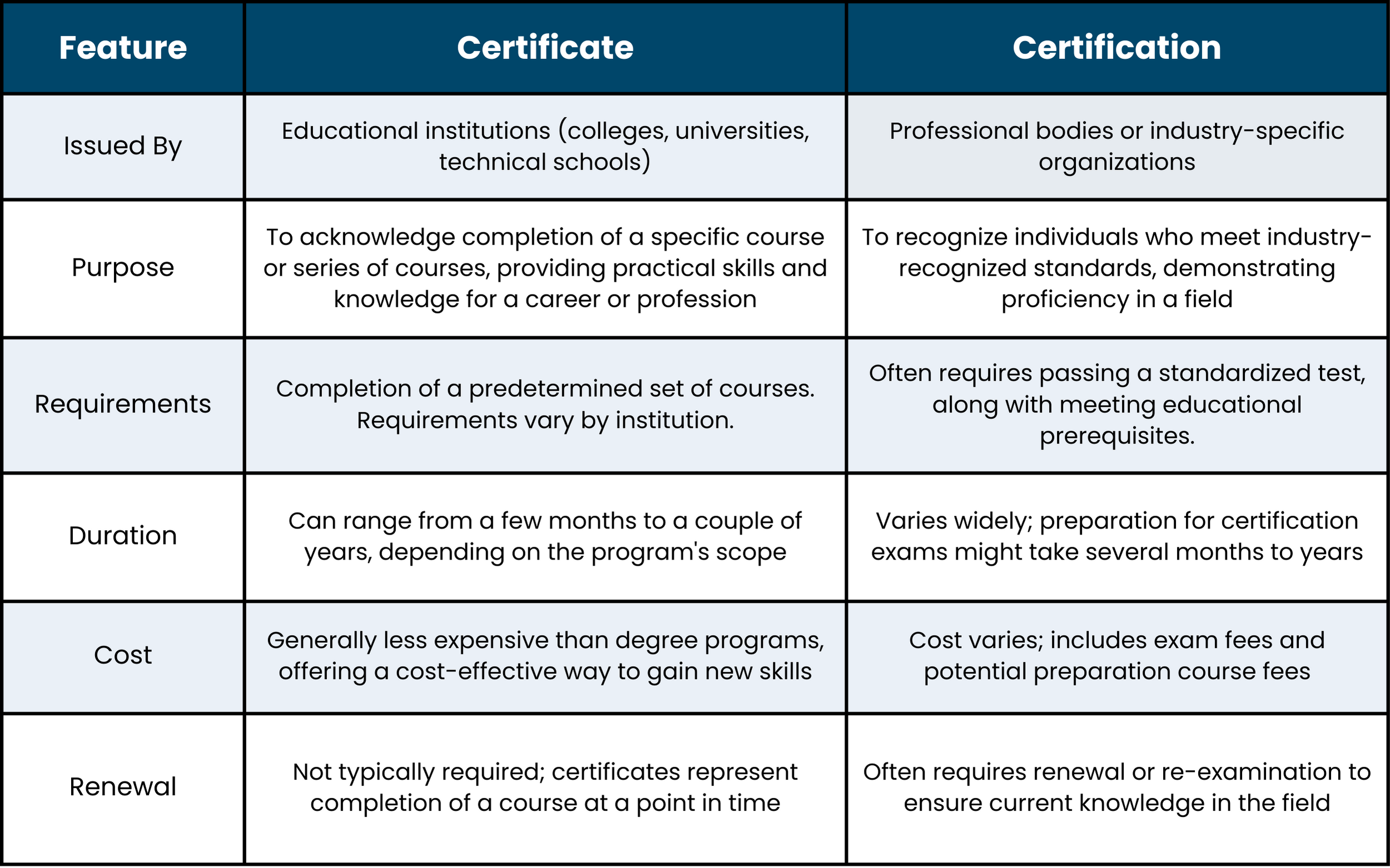
What Are Certificate Programs?
Benefits of Certificate Programs
Short Duration
Certificate programs are designed to be completed within a relatively short timeframe, which means you can quickly gain the relevant competencies and skills needed to advance in your career.
Flexible Learning
With options for part-time, online, and intensive formats, certificate programs cater to a diverse range of learning preferences and life situations.
Career Advancement
By focusing on practical skills and knowledge that enhance your employability, certificate programs open doors to new job opportunities and career paths.
Industry Alignment
Certificate programs are closely aligned with current market demands and industry standards, ensuring that the skills you acquire are immediately applicable and highly valued in the workplace.
What Is Certification?
Certification represents a formal recognition of an individual's expertise and skills in a specific domain, validated through assessments and standards set by industry-recognized bodies or professional organizations. Unlike certificate programs, certification is not an educational course but a process that often requires passing rigorous exams and, in some cases, demonstrating practical experience in the field. This validation is typically linked to a profession, technology, or industry methodology, signifying a standardized level of expertise and commitment to ongoing professional development.
Benefits of Certifications
Professional Recognition
Achieving certification offers you formal recognition of your expertise and knowledge in your field, distinguishing you from non-certified peers.
Enhanced Job Opportunities
Many organizations prioritize certified professionals during the hiring process, viewing certification as evidence of a candidate's commitment to their profession and mastery of specific skills.
Access To A Professional Network
Being certified often includes membership in a professional body or society, granting access to a network of peers, industry leaders, and continuous learning opportunities.
Commitment To Professional Development
Certification usually requires ongoing education and renewal processes, demonstrating to employers and colleagues your commitment to staying current with industry trends and continuously improving your skills.
Marketability
Certification enhances your resume, making you more attractive to potential employers. It signals that you have a proven level of knowledge and expertise that can contribute significantly to an organization's success.
Certificate vs. Certification: Comparing the Two Paths

Making The Choice
Choosing between a certificate program and professional certification depends largely on your current professional status, your career aspirations, and the specific requirements of your industry. Certificate programs offer a quick, focused way to acquire new skills or enhance existing ones, making them ideal for immediate job readiness and flexibility in learning. On the other hand, certifications provide a standardized recognition of your expertise and dedication to professional growth, often required or highly valued in certain fields. Both paths can significantly impact your career trajectory, opening doors to new opportunities and affirming your commitment to lifelong learning and professional excellence.
Opt for a certificate program if you're seeking to gain new skills quickly or to make an entry into a new field.
Pursue certification if you aim to establish your expertise and credibility within your current profession.
Washington Technical Institute
If you’re looking for a career pathway that is less costly and can be achieved quickly, then check out the certificate programs offered by Washington Technical institute. Washington Technical Institute’s fully online certificates can be completed in a matter of months, with daily or bi-weekly start dates. Such flexible start dates make these programs unique and much more accessible for our students. Most of our certificates can be earned as a self-paced program, meaning that you can work at your own pace to complete your work, even finishing early if you have the time and motivation to do so. An additional benefit of WTI’s programs is that we offer affordable pricing and monthly payments to help our students leave school without debt.
Although our goal is to help our students graduate their programs with little to no debt, we also recognize that some students might need to utilize a loan for their educational investment. We are excited to announce our partnerships with Climb Credit or Ascent, student lending companies focused on financing career-building programs.
If you’re ready to enroll and start working on a plan for the personal and professional benefit of professional development, you can register for your program online through our website. Still have questions about our programs? Feel free to call us at 800-371-5581 or text us at 952-465-3702 to speak with an admissions specialist.


